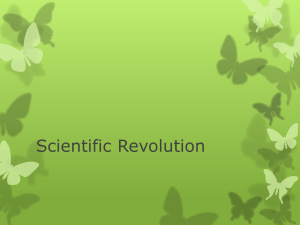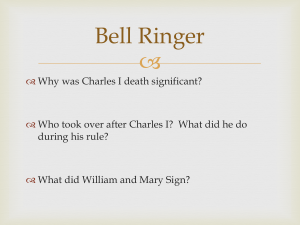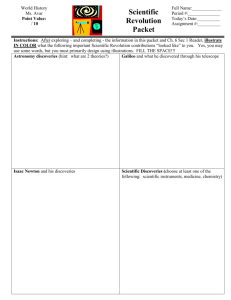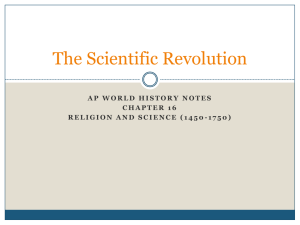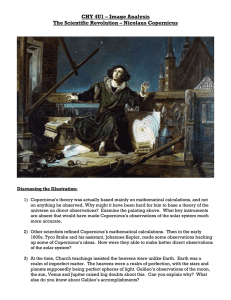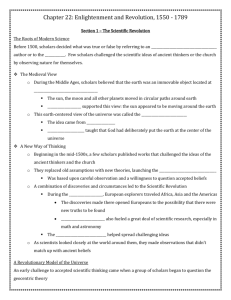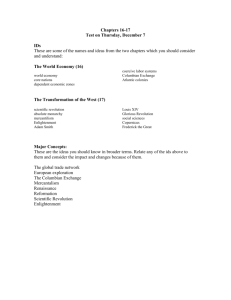Bell Ringer
advertisement
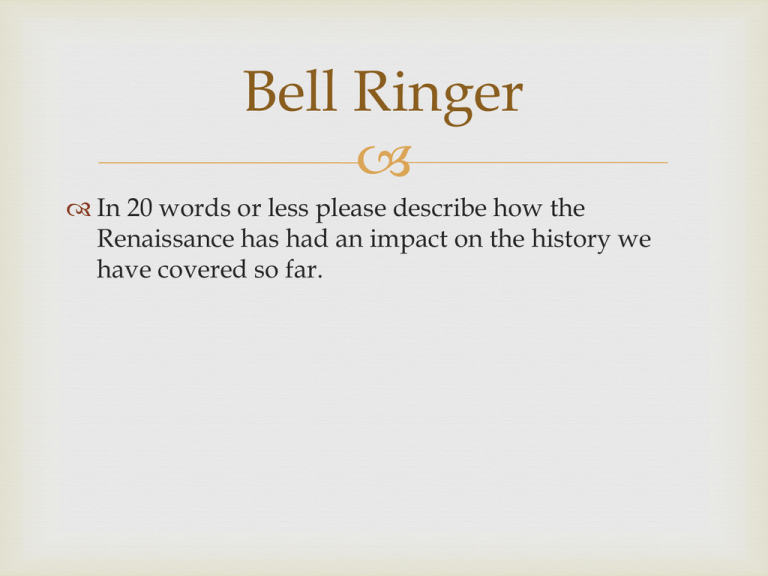
Bell Ringer In 20 words or less please describe how the Renaissance has had an impact on the history we have covered so far. Agenda/Objectives Grade our pre test Begin on the Scientific Revolution - Flash back of Ancient ideas - Clash with new ideas How did the Age of Explorations influence the Scientific Revolution? Names and theories New Ideas conflict with Church Ideas Homework - Reading 1550 - 1789 Roots of Modern Science Middle Ages: - Earth was an unmoving object. - Sun, moon, and stars moved around the earth. - Heaven was beyond the stars. Roots of Modern Science Geocentric Theory – Earth was the center of the universe. - Idea came from Aristotle (Greek philosopher 4th century B.C.E.) Christianity taught that God deliberately placed earth at the center of the universe. True or False based on the Bible. Scientific Revolution: A new way of thinking about the natural world; based upon careful observation and a willingness to question accepted beliefs. - Mid 1500s, a few scholars published works challenging the church and ancient thinkers. Quick Video http://www.youtube.com/watch?v=zHUWP9zu4W 8 Scientific Revolution What helped the spread: - Muslim Scholars work translated by European Scholars. - Studied ancient views and current views Found that ancient authorities often did not agree with each other. - Discovery of new people, plants, and animals in Africa, Asia, and the Americas. Opened ideas to possible new truths. What helped spread the ideas of the Scientific Revolution? The Printing Press Who invented the Printing Press? Johannes Gutenberg Who gave him the idea of the invention? The Chinese Explorations fuels Revolution Why do you think??? Expanded Astronomy and Mathematics. Needed better navigation. Reached Ancient limits and needed to know more. Heliocentric Theory Nicolaus Copernicus came up with theory. Sun is the center of the universe. - Earth, planets, and stars revolved around sun. What is wrong about this theory? Stars do not revolve around sun. Nicolaus Copernicus Heliocentric Theory Copernicus Feared persecution and rejection did not publish ideas until 1543. Book: On the Revolutions of the Heavenly Bodies - Stirred little controversies at first. Johannes Kepler Continued the work of Tycho Brahe. Concluded mathematical laws govern planetary motion. Kepler’s laws proved Copernicus to be true. Galileo Galilei Challenged old ideas: - Aristotle's idea that heavier objects fall faster than lighter objects.---- proved it wrong Made improvements to the telescope and used it in 1609. Galileo 1610 Published newsletter Starry Messenger. Announced: - Jupiter had 4 moons - Sun had dark spots - Earth’s moon had a rough and uneven surface Shattered Aristotle's theory that moons and stars were made of pure and perfect substance. Laws of Motion and other theories supported Copernicus. Conflict with the Church Why would the church have issues with these new ideas? Conflict with the Church Both Catholics and Protestants frightened by these ideas. People may question the teachings and authority of the church. 1633 – Galileo stood trial and under threat of torture read aloud a confession agreeing his ideas and Copernicus ideas were false. Died in 1642 under house arrest. Writing Critically Using the term “Scientific Revolution” Come with a sentence or word that best describes the Scientific Revolution. S – word or sentence… R C E I V E O N L T U I T F I I O C N
